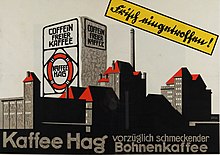

Café HAG is a worldwide brand of decaffeinated coffee currently owned by JDE Peet's. [1]


Café HAG is a worldwide brand of decaffeinated coffee currently owned by JDE Peet's. [1]


Café HAG was founded in Bremen in 1906 as Kaffee-Handels-Aktiengesellschaft (Coffee Trading Limited). The company's founder was Ludwig Roselius, who codeveloped the first commercial decaffeination process. Alfred Runge and Eduard Scotland designed posters [2] and packaging, and are credited with designs that defined the company.
In the 1920s and 1930s the company was known for the publication of the Café HAG albums of heraldic emblems.
The coffee brand Sanka spun off from Café HAG in 1910 [3] for the French market ("Sanka" is a contraction of sans caféine), and American rights to the Sanka name were sold in 1913.
The Kellogg Company purchased Roselius's American branch (based in Cleveland, Ohio) in 1928, [4] then sold it to General Foods in 1939. [5] General Foods acquired the original German company in 1979. In 1990 Kraft Foods merged with General Foods, thus HAG and Sanka became brands of the American company. The spelling Café HAG was standardized in the 1990s. HAG has been owned by JDE Peet's since 2015. [1]
Café HAG TV adverts were popular in the 1980s; in particular the character Klaus (played by Roger Callister) became something of a cult figure among advertisement aficionados. [6]
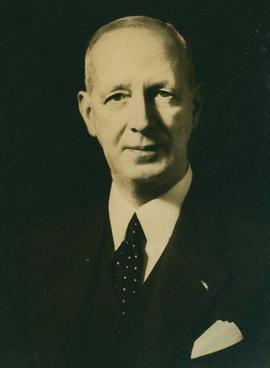
Sosthenes Behn was an American businessman, and the founder of ITT. He held the rank of lieutenant colonel in the U.S. Army.

Maxwell House is an American brand of coffee manufactured by a like-named division of Kraft Heinz in North America and JDE Peet's in the rest of the world. Introduced in 1892 by wholesale grocer Joel Owsley Cheek, it was named in honor of the Maxwell House Hotel in Nashville, Tennessee, which was its first major customer. For nearly 100 years, until the late 1980s, it was the highest-selling coffee brand in the United States. The company's slogan is "Good to the last drop," which is often incorporated into its logo and is printed on its labels.
Decaffeination is the removal ("de-") of caffeine from coffee beans, cocoa, tea leaves, and other caffeine-containing materials. Decaffeinated products are commonly termed by the abbreviation decaf. Decaffeinated drinks contain typically 1–2% of the original caffeine content, but sometimes as much as 20%.
Post Consumer Brands is an American consumer packaged goods food manufacturer headquartered in Lakeville, Minnesota.

General Foods Corporation was a company whose direct predecessor was established in the United States by Charles William Post as the Postum Cereal Company in 1895.
Peet's Coffee is a San Francisco Bay Area-based specialty coffee roaster and retailer owned by JAB Holding Company via JDE Peet's. Founded in 1966 by Alfred Peet in Berkeley, California, Peet's introduced the United States to its darker roasted Arabica coffee in blends including French roast and grades appropriate for espresso drinks. Peet's offers freshly roasted beans, brewed coffee and espresso beverages, as well as bottled cold brew. In 2007, Peet's opened the first LEED Gold Certified roastery in the United States. Peet's coffee is sold in over 14,000 grocery stores across the United States.

Sanka is a brand of instant decaffeinated coffee, sold around the world, and was one of the earliest decaffeinated varieties. Sanka is distributed in the United States by Kraft Heinz.

Douwe Egberts is a Dutch brand of coffee which is majority-owned by JDE Peet's. It was founded in Joure, Netherlands, by Egbert Douwes in 1753 as De Witte Os, a general grocery shop. The company later started dealing specifically in coffee, tea, and tobacco. By 1925, it had changed its name to Douwe Egberts and introduced its logo, a red seal with a "D.E." initialism.

Gevalia is the largest coffee roastery in Scandinavia. In North America, the company sells coffee directly to consumers via home delivery and through big box stores such as Wal-Mart. Gevalia discontinued sales of tea in 2015. Customers order from a customer service center and a website that was relaunched in August 2009. Gevalia is a wholly owned subsidiary of Kraft Heinz based in Chicago, Illinois, in North America and JDE Peet's in rest of the world. Gevalia produces more than 40 different varieties of coffee and tea.
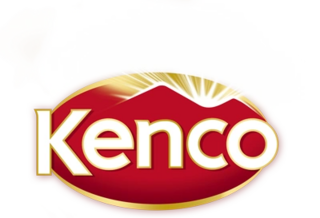
Kenco is a British brand of instant, roast and ground coffee sold by JDE Peet's in the United Kingdom and Ireland. Originally known as the Kenya Coffee Company, they started distributing coffee to Britain in 1923. Shortly after, they opened a coffee shop in Sloane Square and then changed their name to Kenco in 1962.

Ludwig Roselius was a German coffee merchant and founder of the company Kaffee HAG. He was born in Bremen and is credited with the development of commercial decaffeination of coffee. As a patron, he supported artists like Paula Modersohn-Becker and Bernard Hoetger and turned the Böttcherstrasse street in Bremen into an artwork.

The Tassimo Hot Beverage System is a consumer single-serve coffee system that prepares one-cup servings of espresso, regular coffee, tea, hot chocolate and various other coffee drinks, notably those including milk such as latte or cappuccino. The brand is owned by JDE Peet's in most of the world and Kraft Heinz in North America.

Bernhard Hoetger was a German sculptor, painter and handicrafts artist of the Expressionist movement.
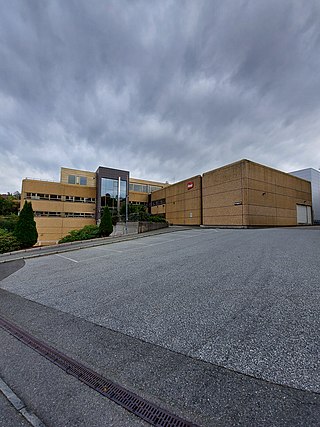
Friele is a Norwegian coffee manufacturer and brand based in Midtun, a commercial and residential district of the borough of Fana in Bergen, Norway. Friele is the largest producer of coffee in Norway. It is part of JDE Peet's.
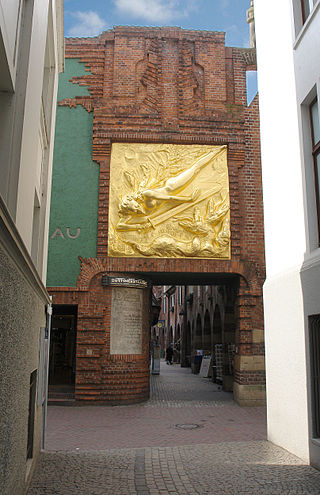
Böttcherstraße is a street in the historic centre of Bremen, Germany. Only about 100 m (330 ft) long, it is famous for its unusual architecture and ranks among the city's main cultural landmarks and visitor attractions. Most of its buildings were erected between 1922 and 1931, primarily as a result of the initiative of Ludwig Roselius, a Bremen-based coffee-trader, who charged Bernhard Hoetger with the artistic supervision over the project. The street and its buildings are a rare example of an architectural ensemble belonging to a variant of the expressionist style. Several of the houses can be classed as Brick Expressionism. Since 1973, the ensemble has been protected by the Monument Protection Act.
JAB Holding Company is a German conglomerate, headquartered in Luxembourg, that includes investments in companies operating in the areas of consumer goods, coffee, luxury fashion, animal health, and fast food, among others.

The Ludwig Roselius Museum on Böttcherstraße in the old town of Bremen, Germany, houses the private collection of the successful coffee merchant Ludwig Roselius (1874–1943). Artefacts from the Middle Ages to the Baroque period are on display. The house itself which was completed in 1588 has a history going back to the 14th century.

The House of the Seven Lazy Brothers is a historic building in Bremen, Germany, completed in 1927. With a name based on a local legend, the building located in Böttcherstraße in the old town was built by the prosperous coffee merchant Ludwig Roselius to a design by Bremen architects Eduard Scotland and Alfred Runge. The first version of the house was home to the advertising department of Roselius's coffee company and the Deutscher Werkbund association of craftsmen. When it was rebuilt in 1954 the new design was based on a traditional local story.

JDE Peet's N.V. is an American-Dutch company that owns beverage brands, mostly of coffee, tea and hot chocolate. It was formed in 2015 following the merger of the coffee division of Mondelez International with Douwe Egberts as Jacobs Douwe Egberts. The stock of JDE Peet's is listed on the Euronext Amsterdam stock exchange.
Pressa was an International Press Exhibition held in Cologne between May and October, 1928.
![]() Media related to Coffee Hag at Wikimedia Commons
Media related to Coffee Hag at Wikimedia Commons